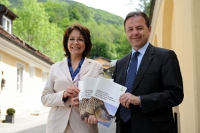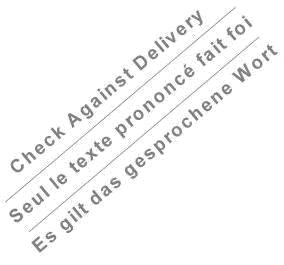Unlocking the potential of European aquaculture

Conference "Common Fisheries Policy: Which Future for Aquaculture?"
Salzburg, 11 May 2012
Commissioner Maria Damanaki together with Nicolaus Berlakovich, Austrian Minister of Agriculture, Forestry, Environment and Water Management hosted a high-level conference on the future of European Aquaculture, to discuss how the European Commission, the Member States, the European Parliament and the stakeholders can contribute to unlocking the potential for the further development of aquaculture and in particular freshwater aquaculture in Europe.

Dear Ministers, honourable Members of the European Parliament, dear Participants,
First of all I would like to thank Minister Berlakovich for co-organising this important event with me. Co-organisation implies cooperation and dialogue. For me, this conference should be about preparing the ground for a consensus on how to move the different segments of European aquaculture forward. I hope that we can reach this consensus in Galicia, in November.
Aquaculture is a key element of our fisheries reform package. Never has it been advanced more prominently than under current CFP proposals. At the same time, aquaculture is one of the numerous sectors where the EU has to "roll up its sleeves". Our Europe 2020 agenda pushes, across all sectors of the economy, for innovative, sustainable and inclusive growth.
The natural productivity of the earth and its oceans has its limits. With a growing world populations and globally raising standards of living, capture fisheries, even if well managed and thriving, would not be able to meet a demand for seafood that is constantly rising. As you know, the EU itself depends more and more on imports. So here we can create an alternative to overfishing.
Sustainable aquaculture can feed our population, providing development employment and jobs.
We can be proud of European aquaculture: it respects the highest standards of environmental sustainability to offer real quality products, without neglecting the need for animal health and consumer protection. Europe is at the forefront from a technological viewpoint, its industry is stagnating. We have to find out why.
First, we should identify the main hurdles and bottlenecks that prevent European aquaculture from flourishing. If we do not manage this, we risk a phenomenon like "carbon leakage". Our industry will die and we will increasingly import aquatic food coming from elsewhere, without guarantee that the same standards will have been respected.
To identify these obstacles, the Commission intends to start a consultation process in the coming weeks, a first version of this document has been sent around to participants in advance. Your input on this is welcome before it starts being circulated more widely. Obviously profitability expectations determine the investments. As public authorities we should leverage private investments, not replace them. Here cutting red tape will be crucial to encourage investments and let the sector develop. We need to reduce the time it takes to set up a business or to obtain a license – and this requires coordinated action by all levels of authorities, EU, national and regional: let's work together! I understand this afternoon's session of the conference will be devoted to this. I also agree with the message of our Member States, insisting on not increasing the already existing administrative burden on aquaculture.
Competition for space poses another major challenge to the economic development of freshwater fish farming or farming sites in coastal areas.
Here we should look more carefully at how to site aquaculture in waters and on land, and also consider the potential co-location with other economic activities. For example, some Member States are researching the option to co-develop aquaculture with wind farms or solar energy plants. I would also be interested in hearing whether there are any such projects as regards freshwater aquaculture.
Many aquaculture farms are located in or close to Natura 2000 areas. They are contributing to the maintenance and preservation of aquatic biodiversity. But the Natura 2000 "label", in some cases leads to creating uncertainty for professionals and entrepreneurs. So, the Commission is developing a set of guidelines to illustrate the compatibility of aquaculture activities and the Natura 2000 nature conservation objectives. These Guidelines will be adopted in June/July of this year.
The reform of the Common Market Organisation in the framework of our CFP proposal will reinforce Producers Organisations and inter-branch organisations. I hope this will help rendering the aquaculture sectors more professional. Starting from existing structures, we should support tailored production and marketing plans.
A second leg concerns information to consumers.
Very often, consumers are unable to recognise, let alone reward, the high quality of EU farmed products. If we highlight these quality features properly, this can only be good for both citizens and industry. This also sounds as the main avenue as regards addressing the issue of the "level playing field".
The proposed creation of an Advisory Council for Aquaculture in our CFP Reform will provide a permanent consultation forum for all interested parties and can contribute to this perspective.
In our proposal for a European Maritime and Fisheries Fund, we give major prominence to aquaculture. The Fund will seek to increase the competitiveness of enterprises, create jobs, promote traditional forms of aquaculture. It will also specifically stimulate innovation. It will support projects that use new techniques, develop new products or processes, save energy or reduce environmental impacts.
I have heard the call of several Member States for safeguarding investments in existing facilities. I understand the need to maintain continuity. The aim is clearly not to exclude them from our policies, but to help them more forward.
So, I have linked the funds to the national multiannual plans to motivate national governments to face the problems of the sector. Naturally, each segment of the aquaculture, each country has different ambitions. I do not think, when promoting regionalisation in the CFP, that in aquaculture we should insist on "one size fits all". That's why our European framework will be limited to the main priorities and general targets. These will be short and non-prescriptive. Subsequently, Member States will be asked to adopt their own multiannual plans for aquaculture.
To conclude, ladies and gentlemen,
One quarter of all the fish products consumed in the EU comes from aquaculture. Over a third of our total seafood imports are farmed products.
At global level, FAO estimates that today, half of the fish the world consumes comes from aquaculture; by 2030, it will be 65 percent. So production will keep rising. Aquaculture is likely to remain one of the fastest growing segments of the food industry. We cannot miss the train a second time!
I do not believe in miracles. But I believe that human effort has the power to change the face of the earth, especially when it is done in common. Making EU aquaculture prosperous to feed our population sustainably is not going to be like a Sunday stroll. It will require our coordinated efforts. I look forward to debating with you on how to achieve such coordination.


